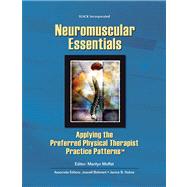
Note: Supplemental materials are not guaranteed with Rental or Used book purchases.
Purchase Benefits
What is included with this book?
| Dedication | |
| Acknowledgments | |
| About the Editors | |
| Contributing Authors | |
| Preface | |
| Foreword to the Essentials in Physical Therapy Series | |
| Introduction | |
| Primary Prevention/Risk Reduction for Loss of Balance and Falling (Pattern A) | |
| Impaired Neuromotor Development (Pattern B) | |
| Impaired Motor Function and Sensory Integrity Associated With Nonprogressive Disorders of the Central Nervous System- Congenital Origin or Acquired in Infancy or Childhood (Pattern C) | |
| Impaired Motor Function and Sensory Integrity Associated With Nonprogressive Disorders of the Central Nervous System- Acquired in Adolescence or Adulthood (Pattern D) | |
| Impaired Motor Function and Sensory Integrity Associated With Progressive Disorders of the Central Nervous System (Pattern E) | |
| Impaired Peripheral Nerve Integrity and Muscle Performance Associated With Peripheral Nerve Injury (Pattern F) | |
| Impaired Motor Function and Sensory Integrity Associated With Acute or Chronic Polyneuropathies (Pattern G) | |
| Impaired Motor Function, Peripheral Nerve Integrity, and Sensory Integrity Associated With Nonprogressive Disorders of the Spinal Cord (Pattern H) | |
| Impaired Arousal, Range of Motion, and Motor Control Associated With Coma, Near Coma, or Vegetative State (Pattern I) | |
| Abbreviations Brand Name Drugs and Products | |
| Index | |
| Table of Contents provided by Publisher. All Rights Reserved. |
The New copy of this book will include any supplemental materials advertised. Please check the title of the book to determine if it should include any access cards, study guides, lab manuals, CDs, etc.
The Used, Rental and eBook copies of this book are not guaranteed to include any supplemental materials. Typically, only the book itself is included. This is true even if the title states it includes any access cards, study guides, lab manuals, CDs, etc.